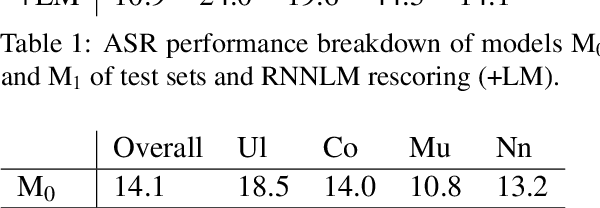Ibon Saratxaga
Decoding Phone Pairs from MEG Signals Across Speech Modalities
May 21, 2025Abstract:Understanding the neural mechanisms underlying speech production is essential for both advancing cognitive neuroscience theory and developing practical communication technologies. In this study, we investigated magnetoencephalography signals to decode phones from brain activity during speech production and perception (passive listening and voice playback) tasks. Using a dataset comprising 17 participants, we performed pairwise phone classification, extending our analysis to 15 phonetic pairs. Multiple machine learning approaches, including regularized linear models and neural network architectures, were compared to determine their effectiveness in decoding phonetic information. Our results demonstrate significantly higher decoding accuracy during speech production (76.6%) compared to passive listening and playback modalities (~51%), emphasizing the richer neural information available during overt speech. Among the models, the Elastic Net classifier consistently outperformed more complex neural networks, highlighting the effectiveness of traditional regularization techniques when applied to limited and high-dimensional MEG datasets. Besides, analysis of specific brain frequency bands revealed that low-frequency oscillations, particularly Delta (0.2-3 Hz) and Theta (4-7 Hz), contributed the most substantially to decoding accuracy, suggesting that these bands encode critical speech production-related neural processes. Despite using advanced denoising methods, it remains unclear whether decoding solely reflects neural activity or if residual muscular or movement artifacts also contributed, indicating the need for further methodological refinement. Overall, our findings underline the critical importance of examining overt speech production paradigms, which, despite their complexity, offer opportunities to improve brain-computer interfaces to help individuals with severe speech impairments.
Whisper-LM: Improving ASR Models with Language Models for Low-Resource Languages
Mar 30, 2025Abstract:Automatic speech recognition systems have undoubtedly advanced with the integration of multilingual and multitask models such as Whisper, which have shown a promising ability to understand and process speech across a wide range of languages. Despite their robustness, these models often fall short in handling the linguistic distinctions of minority languages. This study addresses this gap by integrating traditional and novel language models with fine-tuned Whisper models to raise their performance in less commonly studied languages. Through rigorous fine-tuning and evaluation across multiple datasets, we demonstrate substantial improvements in word error rate, particularly in low-resource scenarios. Our approach not only does take advantage of the extensive data Whisper was pre-trained on, but also complements its linguistic adaptability by incorporating language models. We obtained improvements up to 51\% for in-distribution datasets and up to 34\% for out-of-distribution sentences using statistical language models, while large language models provided moderate but consistently robust improvement across diverse linguistic contexts. The findings reveal that, while the integration reliably benefits all model sizes, the extent of improvement varies, highlighting the importance of optimized language model parameters. Finally, we emphasize the importance of selecting appropriate evaluation parameters when reporting the results using transformer-based ASR models. In summary, this research clears the way for more inclusive ASR technologies that perform better across languages by enriching their linguistic knowledge. For further implementation details of this study, the technical documentation and source code are available at http://www.github.com/hitz-zentroa/whisper-lm.
Fotheidil: an Automatic Transcription System for the Irish Language
Dec 31, 2024



Abstract:This paper sets out the first web-based transcription system for the Irish language - Fotheidil, a system that utilises speech-related AI technologies as part of the ABAIR initiative. The system includes both off-the-shelf pre-trained voice activity detection and speaker diarisation models and models trained specifically for Irish automatic speech recognition and capitalisation and punctuation restoration. Semi-supervised learning is explored to improve the acoustic model of a modular TDNN-HMM ASR system, yielding substantial improvements for out-of-domain test sets and dialects that are underrepresented in the supervised training set. A novel approach to capitalisation and punctuation restoration involving sequence-to-sequence models is compared with the conventional approach using a classification model. Experimental results show here also substantial improvements in performance. The system will be made freely available for public use, and represents an important resource to researchers and others who transcribe Irish language materials. Human-corrected transcriptions will be collected and included in the training dataset as the system is used, which should lead to incremental improvements to the ASR model in a cyclical, community-driven fashion.
 Add to Chrome
Add to Chrome Add to Firefox
Add to Firefox Add to Edge
Add to Edge